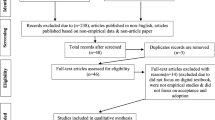Abstract
In view of audiences’ acceptance behavior towards digitized knowledge services of academic publishing, this paper via carrying out researches based on the basic framework of information technology acceptance model, through theoretical analyses and adding new research variables, comes up with a theoretical model of users’ acceptance behavior towards digitized knowledge services of academic publishing, which verifies suppositional relations among perceived usefulness, perceived ease-of-use and behavioral intention of the technology acceptance model, the influence of external variables such as relevance, mutual communication and authoritative evaluation of digitized knowledge service system of academic publishing have on the perceived usefulness and perceived ease-of-use of users as well as the influence of users’ innovation on their behavioral intentions, which to some extent, has a positive guiding significance for the digital transformation of academic publishing.


Similar content being viewed by others
References
Li, D., Song, T., & Bi, S. (2014). Relevance analysis of individual knowledge service and information behavior of user. Information Science, 32(8), 140–143.
Liu, J., & Jin, S. (2014). Kaas(Knowledge as a service): Stratified model of knowledge service based on needs of readers and practice. Information Science, 32(3), 55–60.
Zhang, L. (2015). Research on the system framework of constructing the embedded knowledge service under the perspective of knowledge chain: Taking public security industry as an example. Library and Information Service, 59(3), 35–41.
Kuang, D. (2016). Study on the knowledge service of the PLoS OAJ platform. Chinese Journal of Scientific and Technical Periodicals, 27(1), 72–78.
Wang, F., Ding, Y., Zhou, X., & Yin, M. (2015). Design and implementation of knowledge service platform for enterprises. Journal of Intelligence, 34(8), 204–207.
Davis, F. (1989). Perceived usefulness, perceived ease of use and user acceptance of information technology. MIS Quarterly, 13(3), 319–340.
Varma Citrin, A., Sprott, D. E., Silverman, S. N., & Stem, D. E., Jr. (2000). Adoption of Internet shopping : The role of consumer innovativeness. Industrial Management & Data System, 100(7), 294–300.
Nov, O., & Ye, C. (2009). Resistance to change and the adoption of digital libraries: An integrative model. Journal of the American Society for Information Science and Technology, 60(8), 1702–1708.
Author information
Authors and Affiliations
Corresponding author
Rights and permissions
About this article
Cite this article
Jing, N. Research on Digitized Knowledge Services of Academic Publishing Based on TAM. Wireless Pers Commun 102, 641–651 (2018). https://doi.org/10.1007/s11277-017-5080-8
Published:
Issue Date:
DOI: https://doi.org/10.1007/s11277-017-5080-8




